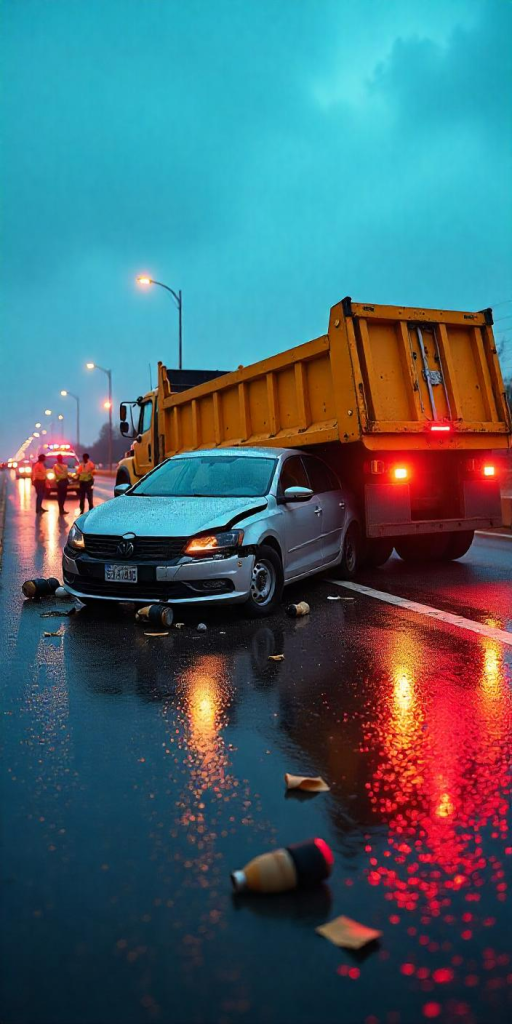by Muhammad Mohsin Iqbal
The surge in road fatalities caused by heavy vehicles in Pakistan is a pressing concern, highlighting systemic failures in governance, regulation, and enforcement. A closer analysis of these accidents reveals a troubling pattern of negligence, corruption, and inefficiency that continues to endanger lives despite existing traffic laws and enforcement measures. The situation demands urgent attention, as the rising number of casualties underscores the dire need for comprehensive reforms in traffic management and regulatory oversight.
Karachi, being Pakistan’s economic hub, has witnessed an alarming rise in heavy vehicle-related accidents. The first 37 days of 2025 saw 99 major accidents, resulting in 39 fatalities. A single day, February 6, recorded five deaths, including a father and son in Malir Halt and three others near Millennium Mall. By mid-February, the death toll had reached 108 within just 45 days. Similar trends are observed in Sargodha, where illegal modifications to dumpers contributed to 12 deaths in January, and in Islamabad, where a dumper overturned on IJP Road on March 28, killing four people, including a 15-year-old girl. Larkana also reported multiple fatalities in March due to reckless heavy vehicle movement. The situation is worsening, with such incidents becoming frequent across different cities in Pakistan, further emphasizing the gravity of the crisis.
An analysis of these incidents identifies reckless driving, illegal vehicle modifications, and lax enforcement as key contributors to these tragedies. A bitter reality further aggravating the situation is that many heavy-duty vehicle drivers operate continuously without adequate rest, often under intense pressure to meet unrealistic delivery schedules. To cope with fatigue, some drivers resort to using drugs and narcotics while driving, which severely impairs their judgment and reaction times, posing grave risks to themselves and others on the road. Many drivers operate without formal training, displaying a blatant disregard for traffic rules.
Unauthorized vehicle modifications, including excessive height adjustments and overloading, further increase the risk of accidents by making vehicles harder to control. The corruption within the transport department allows unfit vehicles to remain on the roads, exacerbating the problem. Despite over 34,000 challans and the arrest of 490 drivers, fatal accidents continue, suggesting that penalties alone fail to act as a deterrent. This indicates a deeper governance failure, where systemic inefficiencies and lack of accountability prevent meaningful change. The persistence of unauthorized heavy vehicle movement during restricted hours highlights weak regulatory oversight and poor coordination between transport authorities and law enforcement agencies.

Responsibility for these recurring accidents is widespread. The transport authorities and local administrations fail to implement and enforce strict regulations, allowing unsafe practices to persist. Trucking companies and vehicle owners prioritize financial gain over public safety, often hiring untrained drivers and neglecting vehicle maintenance. Additionally, reckless driving by individuals exacerbates the issue, making roads unsafe for all users. The absence of modern road safety infrastructure, including surveillance cameras and smart traffic management systems, further worsens the situation.
In stark contrast, developed nations in the Western world and even Middle Eastern countries have successfully minimized road fatalities through strict enforcement of traffic laws, advanced road safety measures, and technological interventions. In Europe and North America, heavy vehicle operations are strictly regulated, with rigorous licensing requirements, extensive driver training programs, and stringent vehicle fitness standards. Advanced technologies such as speed limiters, automatic braking systems, and GPS tracking are mandatory for commercial vehicles. Enforcement is carried out through automated surveillance cameras, with hefty fines and license suspensions acting as effective deterrents. Moreover, urban planning in these countries includes designated lanes for heavy vehicles and specific time restrictions to reduce congestion and accidents.
The Middle East, particularly the UAE and Saudi Arabia, has implemented similar measures with remarkable success. Strict road safety laws, electronic monitoring systems, and heavy penalties for traffic violations have significantly reduced accidents. The UAE’s intelligent traffic management systems track violations in real-time, ensuring immediate action against offenders. Training programs for heavy vehicle drivers are mandatory, and companies that fail to comply with safety standards face heavy fines or suspension. Additionally, the integration of artificial intelligence in traffic management has further enhanced road safety in these countries.
Pakistan can learn valuable lessons from these models to control the rising number of accidents caused by heavy vehicles. A multi-pronged approach is necessary, beginning with the strict enforcement of fitness certification for vehicles to ensure that only roadworthy vehicles operate. A crackdown on unauthorized modifications and untrained drivers is essential, coupled with mandatory training programs to instill responsible driving habits. Enhanced surveillance using automated cameras and stricter penalties for traffic violations could further deter reckless behavior. Additionally, investing in intelligent traffic systems and AI-based monitoring could significantly improve road safety.
Urban planning must incorporate dedicated heavy vehicle lanes and time restrictions to minimize congestion and risks. Public awareness campaigns are also vital in educating both drivers and pedestrians about road safety. The government should reconsider licensing policies, ensuring that only qualified and responsible individuals are permitted to operate heavy vehicles. Strict action against corrupt officials enabling unfit vehicles to ply the roads is also crucial.
The increasing fatalities caused by dumpers and heavy vehicles in Pakistan reflect a deeper crisis in regulatory failure, corruption, and lack of accountability. Without urgent and effective interventions, the roads will continue to be unsafe, and more innocent lives will be lost. The situation demands immediate, concrete action to reform traffic governance, enhance enforcement, and promote a culture of road safety in the country. Learning from global best practices and leveraging modern technology will be key to addressing this crisis effectively and ensuring safer roads for all.
















